Maintaining your swimming pool in proper condition is not a difficult task, but it is a constant one. If you take care of your pool regularly and clean it the way you should, the chances are that you will not have to invest too much time in any significant repairs. In this guide, we will talk about how to maintain and clean your swimming pool the right way and without any professional help.
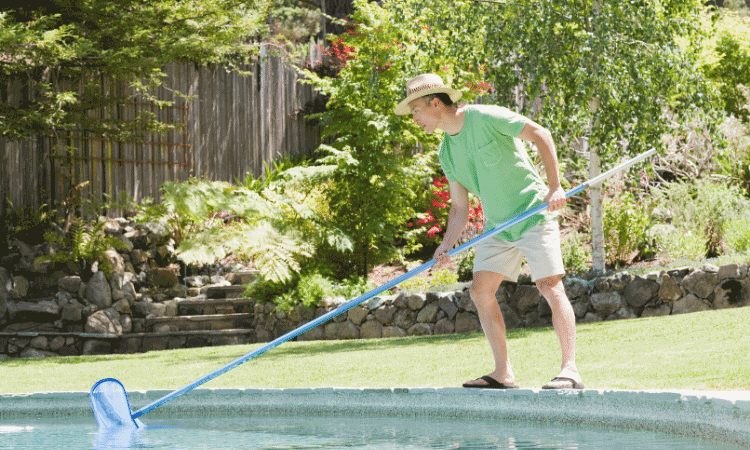
How to Maintain Your Swimming Pool
Maintaining your swimming pool will keep it functional so you can swim in better and healthier conditions. And there are several aspects to consider when you maintain your pool.
Get to Know the Needs of Your Pool
Understanding what your pool needs are essential for creating the best and safest swimming circumstances. And the most important thing you have to know when it comes to your pool is its chemistry. Mostly, you should know your pool’s pH level, chlorine, and calcium.
The pH should be as neutral as possible, and the level of chlorine and calcium will vary according to how much water you have in your pool. What kind of water you use is also essential. Chlorine has a role in disinfecting and offering a proper level of sanitizing to your swimming water.
When it comes to calcium, you want this to not bee too high but also not too low. Not enough calcium in your water will facilitate corrosion and damage the structure of the pool. You will also need Cyanuric acid to protect the level of chlorine from the harmful sun rays, especially during summer days.
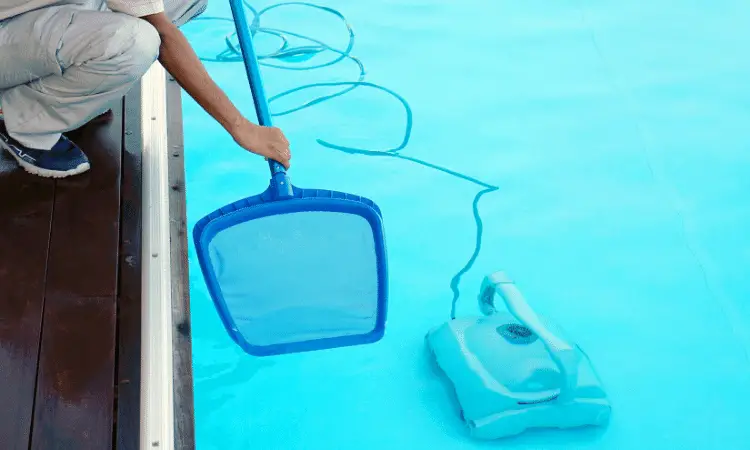
Overall, you should look for the following level in your pool:
– pH level between 7.2 and 7.8
– Alkalinity level between 80 and 120 ppm
– Chlorine level between 1.0 and 2.0 ppm
– Cyanuric acid between 40 and 80 ppm
– Calcium hardness between 180 and 220 ppm
– Other dissolved solids should be less than 5000 ppm
Test Your Pool Water Regularly
Testing the water in your pool is very important as well. As long as you test your water at least once a week, you will know when you need to adjust it and how you need to change the chemicals in it.
The general rule to maintain the chemistry in your pool water says you should test the pH twice a week, the alkalinity level at least once a month, and the chlorine should be checked twice a week as well. Other standards, such as the Cyanuric acid, should be tested only twice each season and the calcium hardness as well.
To properly test the water in your pool, you will have to invest in some testing kits. These testing kits are relatively affordable and easy to find on the market. Your testing kits should test the chlorine level as well as the pH level and alkaline. If you find test kits that check the Cyanuric acid, it is even better as you will have to test that as well.
Once you have the testing kits, all you need to do is put the tip of the test into the water and wait for the results. Each kit will come with detailed instructions that will help you interpret it better. Test the water in your pool according to the schedule above.
Adjust the Chemicals in Your Pool
This is not something you will need to do unless your chemicals are not in the correct parameters. When you need to adjust the chemicals in your pool, you will have to use chlorine, shocking products, and algaecide. But keep in mind that you don’t need all of these products all the time.
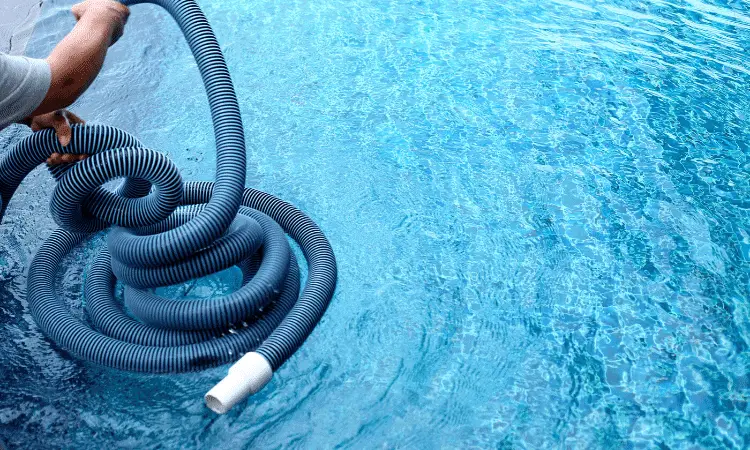
Adjusting Chlorine in Your Pool
Using chlorine will be the most common procedure you will need to do. Chlorine reduces algae and other bacteria in your pool and leaves you with high water quality. This step will make your swimming time not only more pleasant but also safer.
You will have to choose between different chlorine products, but the good news is that they are all efficient just that some of these products will require different ways of using them. For instance, you can get chlorine tabs that are the easiest to use. They dissolve fast and will have sizes between one inch and three inches. They are very efficient as well, and they also contain a stabilizer to protect the chlorine from sunrays.
You can also opt for liquid chlorine, which is also a good option. This will be similar to the bleach you might use in your house. However, the liquid chlorine tends to be a lot stronger and, therefore, toxic. So, following the instructions is vital when using this type of chlorine. A shortcoming of this chlorine is the shelf life, which usually lasts for a few weeks only.
There are also chlorinated granules on the market. These granules should be used daily, and they bring more benefits to your pool. For once, they are chlorinating the water by simply adding the right daily dose to it. They also help to shock your pool, which gets rid of all contaminants.
Shock Your Pool
Shocking your pool should be a regular part of your maintenance schedule. If you shock the water regularly, it will remain clean and reduce eye irritation or unpleasant smells. You can purchase chlorine products that have shocking properties, or you can invest in products that work primarily for shocking your pool.
To shock your pool correctly, you have to mix the shocking solution with the water according to the instructions. Give it time to take action. This time frame is usually 24 hours. After 24 hours test the chemicals in your pool and make sure you have the right levels. You should also run the filter in your pool for another 24 hours before the shocking process is complete.
How to Clean Your Swimming Pool
The water in your pool is not everything that you should pay attention to when you plan your maintenance strategy. You will also have to keep your pool functional and clean at all times.
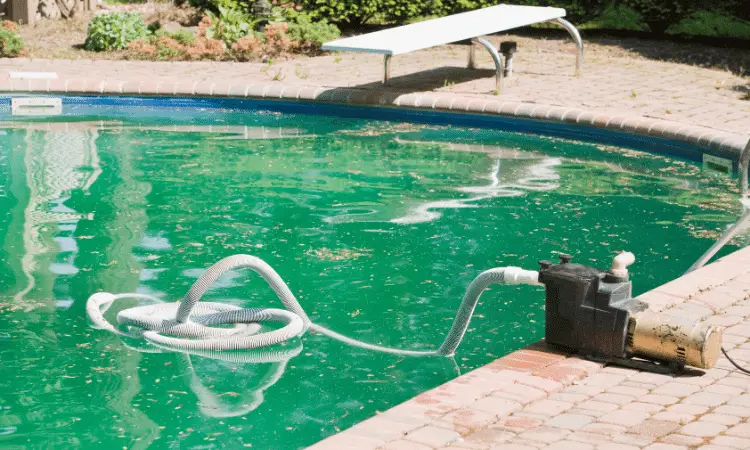
Take care of the Filters of Your Pool
Your pool’s filtration system is an essential part that you should maintain as well. If your filtration system is not working correctly, you will not be able to shock your pool as you need and keep it clean. Luckily, taking care of your filters is relatively easy, and you don’t need to be an expert at it. All you have to do is manually clean any debris you see on the filters and let them run 24 hours whenever you need to shock your pool.
Your pool might work with one of the three filter types, such as sand filters, cartridge filters, or diatomaceous earth filters. All these filter types work just as fine, but they eliminate different types of debris.
Sand filters use metal, concrete, and fiberglass, along with a layer of sand. The sand will be responsible for attracting the debris in your pool.
Cartridge filters have a filtration surface that will catch the debris and keep it there until you remove it.
The diatomaceous Earth filters are made of porous bone material, and they are efficient at catching debris. All you have to do is put the screen in the skimmer, and it will work.
If you use sand filters, you will need to replace the layer of sand once at five years. The cartridge filters will need replacing between three to five years. Also, the diatomaceous earth filters will last for one or two years, according to the type you get.
Clean Your Pool Manually as Often as Possible
To do this, you will have to use brushes, cleaners as well as other tools to catch the debris and remove it from your pool. Get rid of all the waste you can see with your eyes, and don’t postpone this step as it will lead to more significant problems.
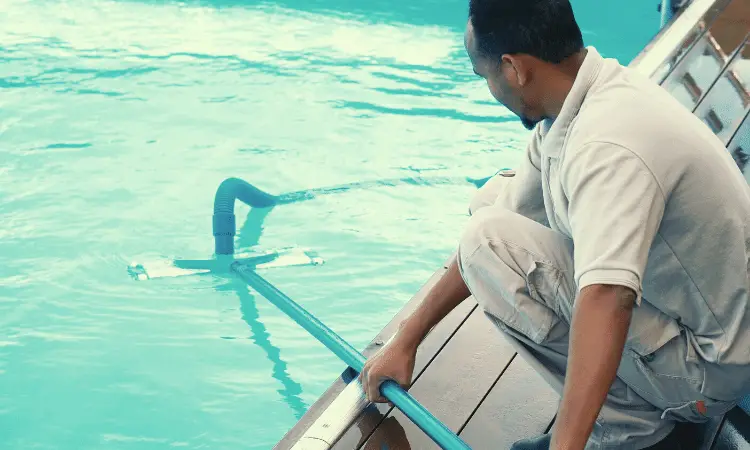
Maintain the Pool Water at the Best Level
The water in your pool should be 1/3 or 1/2 way up to the pool skimmer’s opening. If your water level is higher, it might allow debris to pass through the skimmer and get in the pool. Consequently, if the water level in your pool is too low, your skimmer will attract a lot of air, which could damage your pool engine pump.
Vacuum Your Pool Regularly
Vacuuming your pool is similar to cleaning your house. By doing so, you will eliminate all types of debris from the bottom of your pool. You might want to add some water beforehand, as vacuuming will cause the water to decrease its level. You should add some water as you are backwashing your pool too for the same reason.
Conclusion
As long as you invest time in maintaining your pool at proper parameters, you will not have to worry about dangerous repairs. The correct maintenance, along with a regular cleaning schedule, will keep both your pool system and your swimming water at the best quality. And what is even more important is that you will not need to hire a specialist to take care of your pool’s maintenance. You can do it all by yourself as long as you have the right products. Apply the tips in this article, and you will not have to deal with any hassle when it comes to your pool’s maintenance.